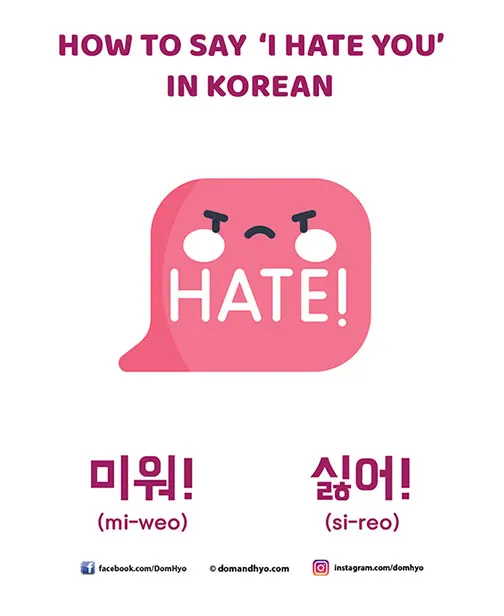
Hate is a strong word to use towards someone. You really have to dislike the person to use it. We also say ‘I hate you’ as a joke when someone plays a prank or jokes around with us as a way of bonding. So how would you say this phrase in Korean? Let’s get right to it!
미워 (mi-weo)
This comes from the verb ‘밉다’ which means ‘to hate’. One thing to note is that this version can only be used for people. Even though it is the strongest version of hate you can use, it can also be used in a cute or joking way, especially from a girl to her boyfriend. You’ll also hear little kids say this to their parents when they can’t do what they want.
Whether it has a serious connotation or not depends on the context. You” usually see this verb used in its present and past tense form.
I would say using this usually means you have some sort of close relationship with the person. Here are some examples:
너는 아직도 내가 미워? (neo-neun a-jik-tto nae-ga mi-wo) = Do you still hate me?
아직도 그 사람이 미워요? (a-jik-tto geu sa-ra-mi mi-wo-yo) = Do you still hate him/her?
정말 다들 너무 미워. (jeong-mal tta-deul neo-mu mi-wo) = I hate you all.
나 너 정말 미웠어. (na neo jeong-mal mi-wo-sseo) = I really hated you.
싫어 (si-reo)
This is the second way you can say to someone ‘I hate you’. It comes from the verb 싫다. What’s the difference between this one and ‘미워’? This one is a bit stronger and this one can be used for people, things, and things you hate doing. You’ll hear kids using this a lot when their parents ask them to do something. They’ll shout ‘싫어!’ which in that context also sounds like a strong no.
When used towards a person, it’s like saying you extremely dislike that person. For example, you would never use this for your parents, but you might use ‘싫어’ towards a coworker or boss. And as said earlier, you can use this for things or actions you hate doing in your daily life.
Like ‘미워’ it’s usually used in its present and past tense forms. Here are some examples:
난 너 냄새가 싫어. (nan neo naem-sae-ga si-reo) = I hate the way you smell.
장마철은 정말 싫어. (jang-ma-cheo-reun jeong-mal ssi-reo) = I really hate the rainy season.
니가 오는 거 싫어. (ni-ga o-neun geo si-reo) = I don’t want you to come.
공부가 싫었어. (gong-bu-ga si-reo-sseo) = I hated studying.
And that’s pretty much it! If you’re new to learning Korean, try listening for these in your daily life or watching/listening to Korean media. You’ll find out that you hear them more often than you think
